Unit 2 Healthy eating grammar
文档属性
| 名称 | Unit 2 Healthy eating grammar |
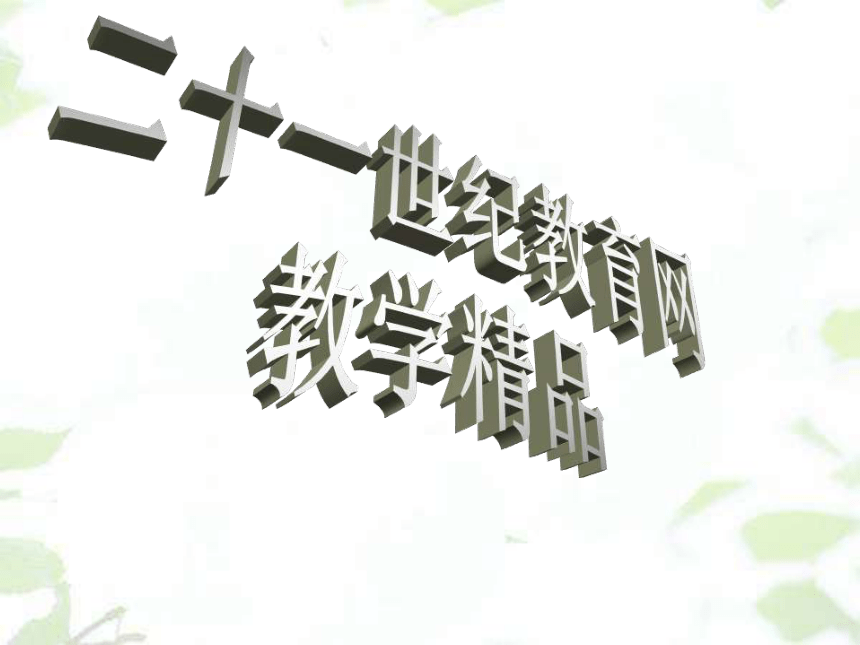
|
|
| 格式 | rar | ||
| 文件大小 | 785.4KB | ||
| 资源类型 | 教案 | ||
| 版本资源 | 人教版(新课程标准) | ||
| 科目 | 英语 | ||
| 更新时间 | 2011-07-02 00:00:00 | ||
图片预览

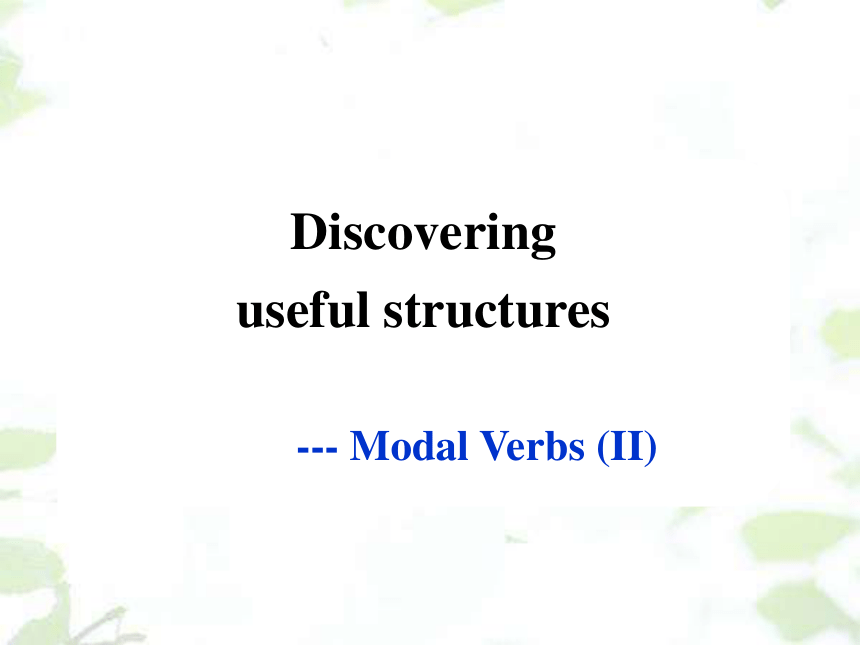
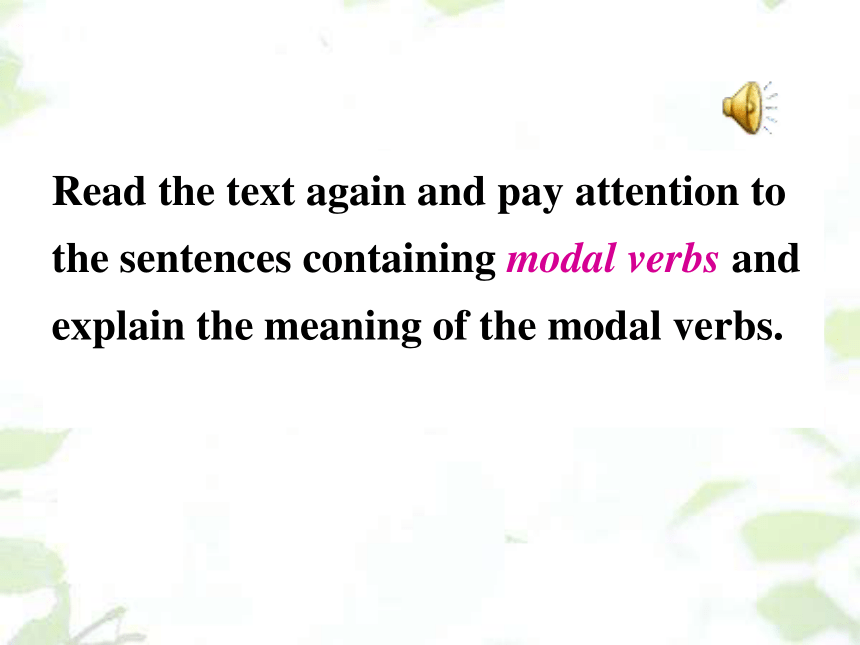
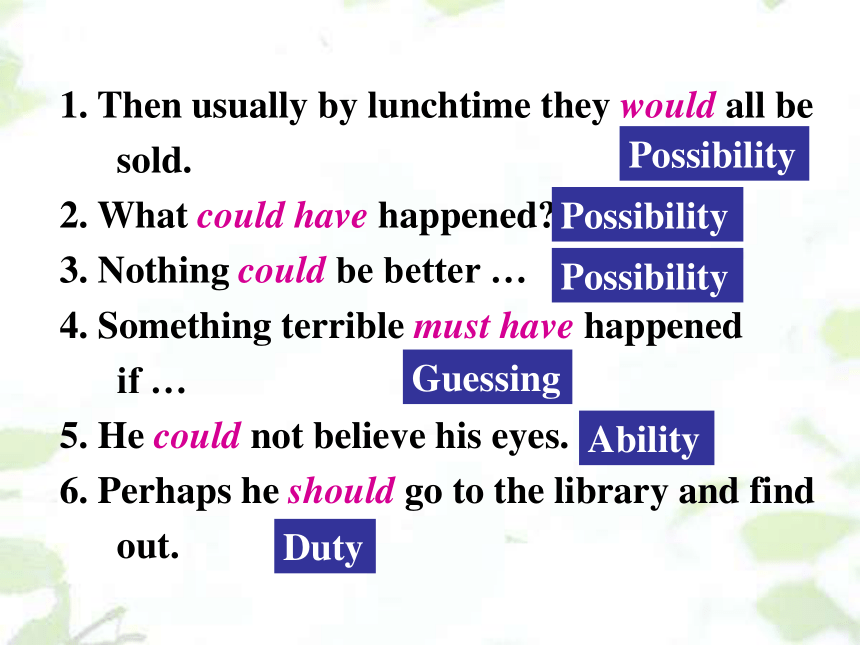

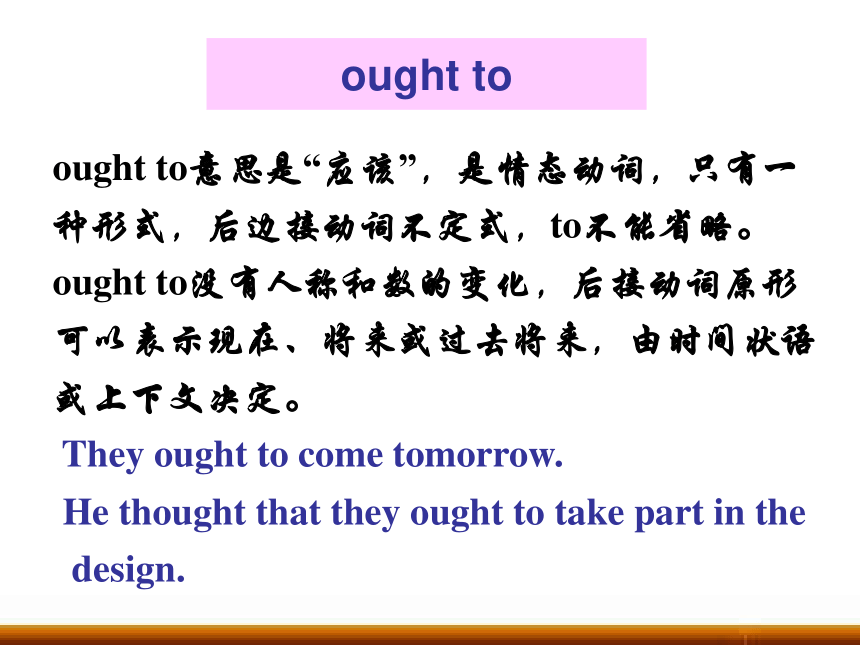
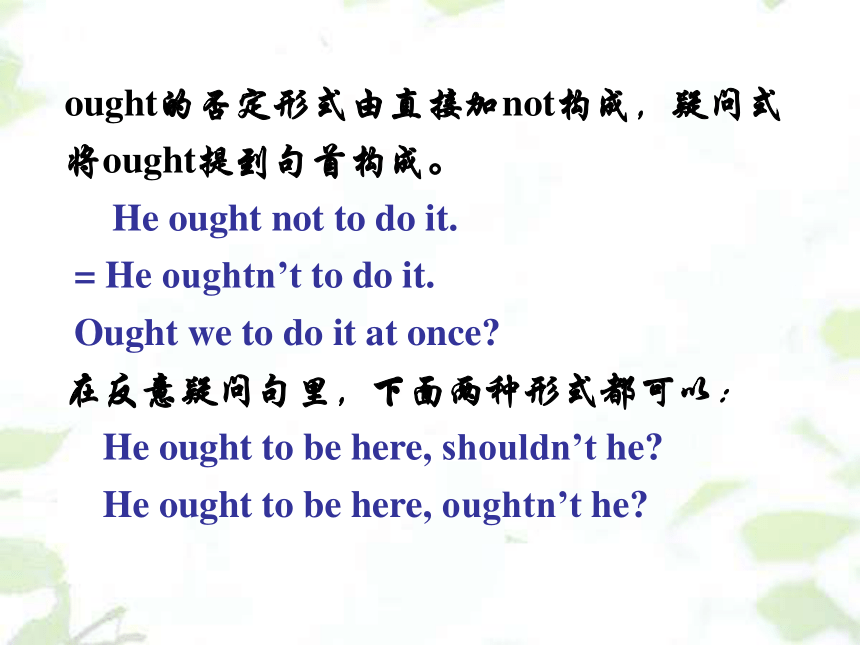
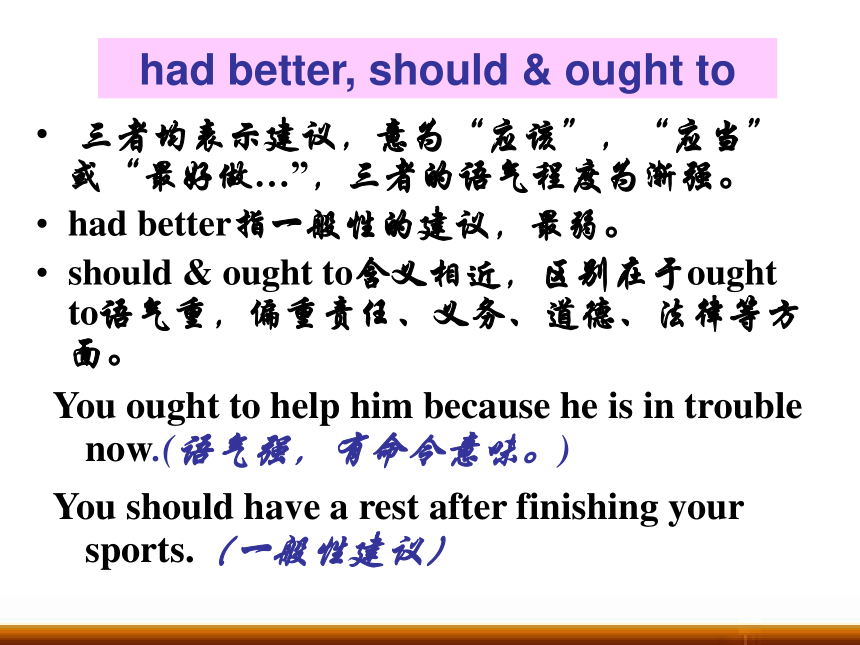
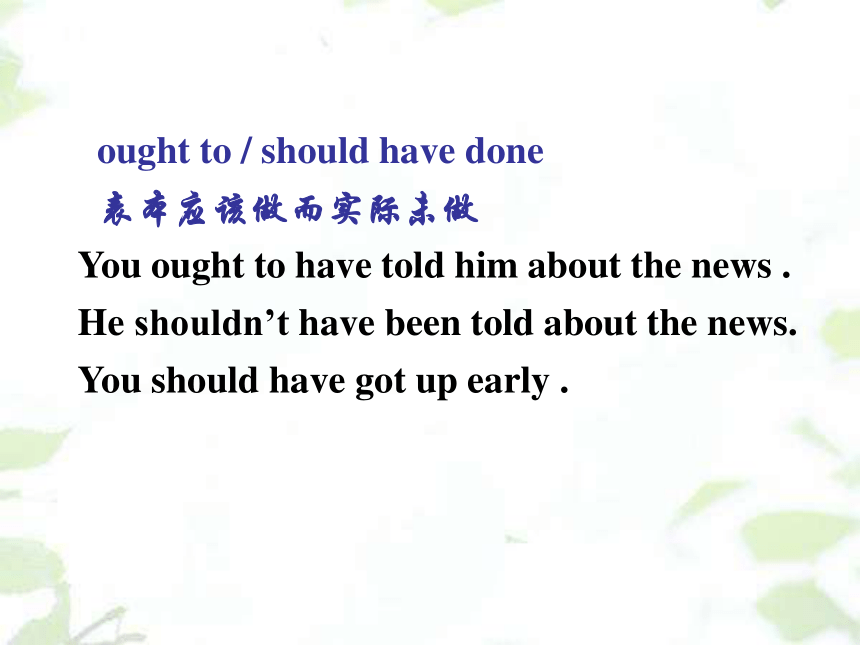
文档简介
(共23张PPT)
Discovering
useful structures
--- Modal Verbs (II)
Read the text again and pay attention to the sentences containing modal verbs and explain the meaning of the modal verbs.
1. Then usually by lunchtime they would all be sold.
2. What could have happened
3. Nothing could be better …
4. Something terrible must have happened if …
5. He could not believe his eyes.
6. Perhaps he should go to the library and find out.
Possibility
Possibility
Possibility
Guessing
Ability
Duty
7. He could not have Yong Hui getting away
with telling people lies!
7. He had better do some research!
8. Even though her customers might get thin
after eating Yong Hui’s food …
9. They would become tired very quickly.
10. …he could win his customers back.
Intention
Duty
Possibility
Intention
Ability
ought to意思是“应该”,是情态动词,只有一种形式,后边接动词不定式,to不能省略。ought to没有人称和数的变化,后接动词原形可以表示现在、将来或过去将来,由时间状语或上下文决定。 They ought to come tomorrow.
He thought that they ought to take part in the
design.
ought to
ought的否定形式由直接加not构成,疑问式将ought提到句首构成。
He ought not to do it.
= He oughtn’t to do it. Ought we to do it at once 在反意疑问句里,下面两种形式都可以: He ought to be here, shouldn’t he He ought to be here, oughtn’t he
三者均表示建议,意为“应该”,“应当”或“最好做…”,三者的语气程度为渐强。
had better指一般性的建议,最弱。
should & ought to含义相近,区别在于ought to语气重,偏重责任、义务、道德、法律等方面。
You ought to help him because he is in trouble now.(语气强,有命令意味。)
You should have a rest after finishing your sports.(一般性建议)
had better, should & ought to
ought to / should have done
表本应该做而实际未做 You ought to have told him about the news .
He shouldn’t have been told about the news. You should have got up early .
have to 强调客观需要,有人称、时态的变化。 而must则表示主观愿望、主观看法,只能用于一般现在时和一般将来时。
--- Would you like to come to my house on
National Day ---Thank you, I’d love to. But I have to see my
uncle on that day.
We must finish the work before lunch.
have to & must
Must they do…
Yes, they must.
No, they needn’t/don’t have to.
must have to
主观/客观 主观 客观
时态 现在,将来 多种
表推测 √ ×
询问意愿 √ ×
否定意义 禁止,不允许 不必
need和dare既可用作情态动词,也可用作实义动词。用作情态动词时,主要用于否定句和疑问句。用作实义动词时,可用于各种句式。 1. 用作情态动词 You needn’t telephone him now.
I don’t think you need worry.
She dare not go out alone at night.
How dare you say I’m unfair
dare & need
2.用作实义动词 You don’t need to do it yourself.
We need to tell them the news.
We should dare to give our own opinion.
He did not dare (to) look up.
I dare say he’ll come again.
(I dare say…为固定习语)
注意对need问句的回答:
--Need I finish the work today
--Yes, ________________.
No, ________________.
No, ________________.
you must
you needn’t
you don’t have to
needn’t 对其它情态动词的回答:
--Shall I tell John about it
--No, you __________.
--No, you __________.
--Must we do it now
--No, you __________.
--No, you __________.
needn’t
don’t have to
needn’t
don’t have to
1. You ____ your tooth pulled out before it rot
completely. A. had better got B. had to get better
C. had better to get D. had better get 2. When we got to the cinema, the film hasn’t
started yet, so we ____. A. needn’t hurry B. didn’t need hurry
C. needn’t to hurry D. needn’t have hurried 3. It was really very dangerous; you ____ him
seriously. A. might have injured B. could injure
C. should have injured D. must injure
D
D
A
4. As he had heart attack, he was told that he
____ continue the work. A. needn’t B. may not C. mustn’t D. can't
5. We ought to help each other in our work, ____
A. oughtn’t we B. should we
C. shouldn't we D. ought to we
6. Two eyes ____see more than one.
A. can B. may C. will D. should
7. When I got to the cinema, the film had already
started; I____ there earlier.
A. ought to get B. ought to have got
C. must have got D. must get
B
A
A
C
8. I thought you _____like something to read, so
I have brought you some books.
A. may B. might C. would D. must
9. Where is my pen I ____it.
A. might lose B. would have lost
C. should have lost D. must have lost
10. I didn’t hear the phone. I ___asleep
A. must be B. must have been
C. should be D. should have been
B
D
B
11. ---There were already five people in the car,
but they managed to take me as well.
---It ____a comfortable journey
A. can’t be B. shouldn’t be
C. mustn’t have been D. couldn’t have been
12. It’s nearly seven o’clock . Jack ___be here at
any moment.
A. must B. need C. should D. could
D
C
13. ---Did the train arrive in time
---No. It _______ two hours ago.
A. must have arrived
B. ought to have arrived
C. must arrive
D. ought to arrive
14. ---Must I drive to his house and pick up the
children
---No, . A. you shouldn’t B. you might not
C. you needn’t D. you mustn’t
B
C
15. We didn’t see Tom at the meeting yesterday.
He it.
A. mustn’t have attended
B. cannot have attended
C. needn’t have attended
D. would have not attended
B
16. There is someone knocking at the door.
it be Tom A. Can B. Must C. Should D. Ought to
A
17. You ________ take me to the station, and my brother is taking me.
A. don’t have to B. mustn’t
C. can’t D. shouldn’t
18. — Must I hand in the homework now
— _________. You can hand it in tomorrow morning.
A. Yes, you must B. No, you needn’t
C. Yes, you need D. No, you mustn’t
A
B
19. — Mum, I climbed to the top of the shelf
and got the Teddy Bear.
— My goodness! You may have hurt yourself. You _____ do that again.
A. don’t have to B. may not
C. needn’t D. mustn’t
20. Everybody is working hard. There
________ be trouble in finishing the work on time.
A. ought not to B. needn’t
C. mustn’t D. ought to not
D
A
Homework
1. Summarize the rules of the modal verbs in your own way.
2. Finish the exercises in Discovering useful structures.
3. Finish exercises in Using structure in Workbook.
Discovering
useful structures
--- Modal Verbs (II)
Read the text again and pay attention to the sentences containing modal verbs and explain the meaning of the modal verbs.
1. Then usually by lunchtime they would all be sold.
2. What could have happened
3. Nothing could be better …
4. Something terrible must have happened if …
5. He could not believe his eyes.
6. Perhaps he should go to the library and find out.
Possibility
Possibility
Possibility
Guessing
Ability
Duty
7. He could not have Yong Hui getting away
with telling people lies!
7. He had better do some research!
8. Even though her customers might get thin
after eating Yong Hui’s food …
9. They would become tired very quickly.
10. …he could win his customers back.
Intention
Duty
Possibility
Intention
Ability
ought to意思是“应该”,是情态动词,只有一种形式,后边接动词不定式,to不能省略。ought to没有人称和数的变化,后接动词原形可以表示现在、将来或过去将来,由时间状语或上下文决定。 They ought to come tomorrow.
He thought that they ought to take part in the
design.
ought to
ought的否定形式由直接加not构成,疑问式将ought提到句首构成。
He ought not to do it.
= He oughtn’t to do it. Ought we to do it at once 在反意疑问句里,下面两种形式都可以: He ought to be here, shouldn’t he He ought to be here, oughtn’t he
三者均表示建议,意为“应该”,“应当”或“最好做…”,三者的语气程度为渐强。
had better指一般性的建议,最弱。
should & ought to含义相近,区别在于ought to语气重,偏重责任、义务、道德、法律等方面。
You ought to help him because he is in trouble now.(语气强,有命令意味。)
You should have a rest after finishing your sports.(一般性建议)
had better, should & ought to
ought to / should have done
表本应该做而实际未做 You ought to have told him about the news .
He shouldn’t have been told about the news. You should have got up early .
have to 强调客观需要,有人称、时态的变化。 而must则表示主观愿望、主观看法,只能用于一般现在时和一般将来时。
--- Would you like to come to my house on
National Day ---Thank you, I’d love to. But I have to see my
uncle on that day.
We must finish the work before lunch.
have to & must
Must they do…
Yes, they must.
No, they needn’t/don’t have to.
must have to
主观/客观 主观 客观
时态 现在,将来 多种
表推测 √ ×
询问意愿 √ ×
否定意义 禁止,不允许 不必
need和dare既可用作情态动词,也可用作实义动词。用作情态动词时,主要用于否定句和疑问句。用作实义动词时,可用于各种句式。 1. 用作情态动词 You needn’t telephone him now.
I don’t think you need worry.
She dare not go out alone at night.
How dare you say I’m unfair
dare & need
2.用作实义动词 You don’t need to do it yourself.
We need to tell them the news.
We should dare to give our own opinion.
He did not dare (to) look up.
I dare say he’ll come again.
(I dare say…为固定习语)
注意对need问句的回答:
--Need I finish the work today
--Yes, ________________.
No, ________________.
No, ________________.
you must
you needn’t
you don’t have to
needn’t 对其它情态动词的回答:
--Shall I tell John about it
--No, you __________.
--No, you __________.
--Must we do it now
--No, you __________.
--No, you __________.
needn’t
don’t have to
needn’t
don’t have to
1. You ____ your tooth pulled out before it rot
completely. A. had better got B. had to get better
C. had better to get D. had better get 2. When we got to the cinema, the film hasn’t
started yet, so we ____. A. needn’t hurry B. didn’t need hurry
C. needn’t to hurry D. needn’t have hurried 3. It was really very dangerous; you ____ him
seriously. A. might have injured B. could injure
C. should have injured D. must injure
D
D
A
4. As he had heart attack, he was told that he
____ continue the work. A. needn’t B. may not C. mustn’t D. can't
5. We ought to help each other in our work, ____
A. oughtn’t we B. should we
C. shouldn't we D. ought to we
6. Two eyes ____see more than one.
A. can B. may C. will D. should
7. When I got to the cinema, the film had already
started; I____ there earlier.
A. ought to get B. ought to have got
C. must have got D. must get
B
A
A
C
8. I thought you _____like something to read, so
I have brought you some books.
A. may B. might C. would D. must
9. Where is my pen I ____it.
A. might lose B. would have lost
C. should have lost D. must have lost
10. I didn’t hear the phone. I ___asleep
A. must be B. must have been
C. should be D. should have been
B
D
B
11. ---There were already five people in the car,
but they managed to take me as well.
---It ____a comfortable journey
A. can’t be B. shouldn’t be
C. mustn’t have been D. couldn’t have been
12. It’s nearly seven o’clock . Jack ___be here at
any moment.
A. must B. need C. should D. could
D
C
13. ---Did the train arrive in time
---No. It _______ two hours ago.
A. must have arrived
B. ought to have arrived
C. must arrive
D. ought to arrive
14. ---Must I drive to his house and pick up the
children
---No, . A. you shouldn’t B. you might not
C. you needn’t D. you mustn’t
B
C
15. We didn’t see Tom at the meeting yesterday.
He it.
A. mustn’t have attended
B. cannot have attended
C. needn’t have attended
D. would have not attended
B
16. There is someone knocking at the door.
it be Tom A. Can B. Must C. Should D. Ought to
A
17. You ________ take me to the station, and my brother is taking me.
A. don’t have to B. mustn’t
C. can’t D. shouldn’t
18. — Must I hand in the homework now
— _________. You can hand it in tomorrow morning.
A. Yes, you must B. No, you needn’t
C. Yes, you need D. No, you mustn’t
A
B
19. — Mum, I climbed to the top of the shelf
and got the Teddy Bear.
— My goodness! You may have hurt yourself. You _____ do that again.
A. don’t have to B. may not
C. needn’t D. mustn’t
20. Everybody is working hard. There
________ be trouble in finishing the work on time.
A. ought not to B. needn’t
C. mustn’t D. ought to not
D
A
Homework
1. Summarize the rules of the modal verbs in your own way.
2. Finish the exercises in Discovering useful structures.
3. Finish exercises in Using structure in Workbook.
同课章节目录
